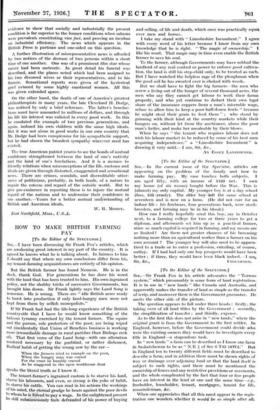HOW TO MAKE BRITISH FARMING PAY
[To the Editor of the SPECTATOR.] have been discussing Sir Frank Fox's articles, which are awakening great interest in my part of the country. It is agreed he knows what he is talking about. In fairness to him I should say that where my own conclusions differ from his, my tenant-farming acquaintances are entirely of his opinion.
tut the British farmer has found Nemesis. He is in the dock, thank God. For generations he has done his worst with the land that has been trusted 'to him. His own ingrained policy, not the shabby tricks of successive Governments, has brought him down. Sir Frank lightly says the Land Song is nonsense. He is wrong. There are " idle British acres ready to burst into production if only land-hungry men were not kept from them by selfish monopolists."
If Sir Frank had had the life-long experience of the British countryside that I have he would knoW something of the hideous tyranny exercised by the tenant farmer. The squire and the parson, sole protectors of the poor, are being wiped Out (incidentallY that Union of Benefices business is working more irremediable damage in rural parishes than Bishops reek of). That first. verse of the Land Song—with one alteration rendered necessary by the purblind, or rather dishonest, Radical habit of getting the wrong sow by the ear— When the farmers tried to trample on the poor, When the hungry man was cursed
For the crust he humbly craved As he staggered to the open workhouse door
speaks the literal truth sal know it.
The tenant-farmer's ingrained custom is to starve his land, starve' his labourers; and even, so strong is the yoke of habit,
to starve his Cattle. Yon Can'read in'hia'actions the workings of his mind, the eternal grudge he bears against the poor devils to whom he is raced tdpay a wage. In the enlightened present he still sube6acioiLsly feels defrauded of his power of buying
and selling, of life and death, which once was practicaliy equal over men, and horses.
I take my stand with " Lincolnshire Incumbent." I agree with every word of his letter because I know froin my own knowledge that he is right. " The magic of ownership." I like his word. That magic may in time even enableihe.British farmer to save his soul.
To the farmer, although Governments may have robbed the landlord of any real control or power to enforce good cultiva- tion, the land is still his step-child only, to be treated as such. But I have watched the helpless rage of the ploughman when the good soil he has sweated over is choked with weeds.
But we shall have to fight the big farmers—the men who screw a living out of the hunger of several thousand acres, the men who say they cannot get labour to work their farms properly, and who yet continue to deduct their own legal share of the insurance coppers from a man's miserable wage, refuse to allow him to keep a poor half-dozen fowls " because he might steal their giain to feed them " ; who stand by grinning with their kind at the country markets while their hangers on, without let from the auctioneer, abuse the poor man's heifer, and make her unsaleable by their blows.
When he says " the tenant who requires labour does not wish his labour market to be reduced by some of his best men acquiring independence," a "Lincolnshire Incumbent" is drawing it very .mild.—I am, Sir, &c.,
AN ESSEX LANDOWNER.


















































 Previous page
Previous page